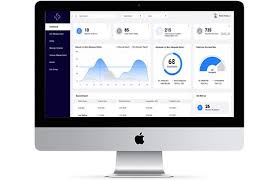Custom Healthcare Software: Revolutionizing the Industry
In today’s fast-paced world, the healthcare industry is constantly evolving to meet the growing demands of patients and providers. Custom healthcare software has emerged as a game-changer, offering tailored solutions to streamline processes, enhance patient care, and improve overall efficiency.
Custom healthcare software is designed to address the unique needs of healthcare organizations, providing personalized tools and features that off-the-shelf solutions may not offer. From electronic health records (EHR) systems to telemedicine platforms, custom software can be tailored to fit specific workflows and requirements.
One of the key benefits of custom healthcare software is its ability to improve patient outcomes. By integrating features such as real-time data analytics, personalized treatment plans, and remote monitoring capabilities, healthcare providers can deliver more effective and efficient care to their patients.
Furthermore, custom healthcare software can help streamline administrative tasks, reduce errors, and enhance communication among healthcare teams. With features such as automated appointment scheduling, billing management, and secure messaging systems, custom software enables healthcare providers to focus more on patient care and less on paperwork.
As technology continues to advance, custom healthcare software will play an increasingly vital role in shaping the future of the industry. By embracing innovative solutions that are tailored to their unique needs, healthcare organizations can stay ahead of the curve and deliver top-quality care to their patients.
In conclusion, custom healthcare software is revolutionizing the industry by offering personalized solutions that improve patient outcomes, streamline processes, and enhance overall efficiency. As technology continues to evolve, custom software will remain a cornerstone of modern healthcare practices.
Understanding Custom Healthcare Software: Key FAQs and Their Benefits
- What is custom healthcare software?
- How can custom healthcare software benefit healthcare organizations?
- What features are typically included in custom healthcare software?
- How does custom healthcare software improve patient care?
- Is custom healthcare software secure and compliant with regulations?
- What is the process of developing and implementing custom healthcare software?
What is custom healthcare software?
Custom healthcare software refers to tailored technological solutions specifically designed to meet the unique needs and requirements of healthcare organizations. Unlike off-the-shelf software, custom healthcare software is customized to fit the workflows, processes, and goals of a particular healthcare provider or facility. This specialized software can encompass a wide range of applications, from electronic health records (EHR) systems to telemedicine platforms, offering features and functionalities that are personalized to optimize patient care, streamline administrative tasks, improve communication among healthcare teams, and enhance overall efficiency in delivering healthcare services.
How can custom healthcare software benefit healthcare organizations?
Custom healthcare software offers a multitude of benefits to healthcare organizations by providing tailored solutions that address their specific needs and challenges. From streamlining administrative tasks to enhancing patient care, custom software can significantly improve efficiency and productivity within healthcare settings. By incorporating features such as real-time data analytics, personalized treatment plans, and secure communication channels, custom healthcare software empowers healthcare providers to deliver more effective care while optimizing workflows. Additionally, custom software can help reduce errors, improve decision-making processes, and ultimately enhance the overall quality of patient outcomes. In essence, custom healthcare software serves as a valuable tool for modernizing healthcare practices and driving positive organizational growth.
What features are typically included in custom healthcare software?
Custom healthcare software is designed to meet the specific needs of healthcare organizations, offering a range of features tailored to streamline processes and enhance patient care. Typical features included in custom healthcare software may encompass electronic health records (EHR) management, appointment scheduling, billing and invoicing, telemedicine capabilities, real-time data analytics, secure messaging systems for communication among healthcare teams, personalized treatment plans, and remote monitoring functionalities. These features work together to improve operational efficiency, optimize patient care delivery, and ensure compliance with regulatory requirements in the healthcare industry.
How does custom healthcare software improve patient care?
Custom healthcare software significantly enhances patient care by providing tailored solutions that address the specific needs of healthcare providers and patients. Through features such as real-time data analytics, personalized treatment plans, and remote monitoring capabilities, custom software enables healthcare professionals to deliver more effective and efficient care. By streamlining administrative tasks, reducing errors, and improving communication among healthcare teams, custom software allows providers to focus on delivering high-quality care to their patients. Custom healthcare software plays a crucial role in improving patient outcomes, ensuring better treatment adherence, and ultimately enhancing the overall quality of care provided in the healthcare industry.
Is custom healthcare software secure and compliant with regulations?
Ensuring the security and compliance of custom healthcare software is a top priority for healthcare organizations. Custom healthcare software is designed with robust security measures in place to protect sensitive patient data and ensure compliance with industry regulations such as HIPAA. By implementing encryption protocols, access controls, regular security audits, and adherence to regulatory requirements, custom healthcare software providers strive to maintain the highest standards of data protection and regulatory compliance. Healthcare organizations can have peace of mind knowing that custom healthcare software is built with security and compliance at its core, providing a secure platform for managing patient information and maintaining regulatory standards.
What is the process of developing and implementing custom healthcare software?
The process of developing and implementing custom healthcare software involves a series of strategic steps to ensure that the final product meets the specific needs and requirements of the healthcare organization. It typically begins with thorough research and analysis to understand the organization’s workflows, challenges, and goals. This is followed by detailed planning, including defining features, functionalities, and user requirements. The development phase involves designing the software architecture, coding, testing, and refining the solution based on feedback. Implementation includes deploying the software, training staff, and ensuring a smooth transition to the new system. Ongoing support and maintenance are crucial to keep the software up-to-date and optimized for efficiency. This comprehensive process aims to deliver a tailored healthcare software solution that enhances patient care, improves operational efficiency, and drives overall success for the organization.

